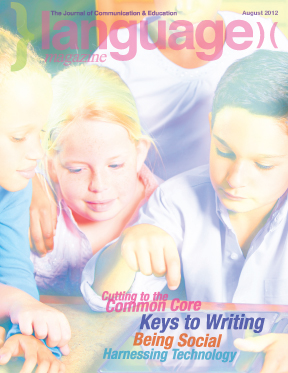Humans Write
As our lives are increasingly filled with video and audio streams from computers, phones, TVs, iPods, and tablets, writing may seem less relevant, yet it is still how much of the world communicates. It is our strongest tool to help organize ideas and thoughts, develop concepts, and learn about ourselves and the way we think. To prove the point, the vast majority of the video and audio we consume is borne through the written word. Writing, especially creative writing, is the original, and perhaps the most complete, form of interactive learning. Yet, most students spend relatively little time honing their writing skills.
Writing assists with many language skills — how to form language, how to spell, how to argue, or how to construct a plot. Of course, speaking can help you learn those things as well, but the ability to review and revise written compositions encourages learning along the way.
Creative writing in particular aids language development at all levels: grammar, vocabulary, phonology, and discourse. It requires learners to manipulate the language in interesting and demanding ways in the attempt to express personal concepts. Much of the school curriculum focuses on the left side of the brain, the practical, logical side. Creative writing summons the right side of the brain, with more emphasis on feelings, physical sensations, and intuition. As art, drama, and music classes are cut from the school day, any opportunity to develop creativity should be welcomed. Writing creatively also affords students of different learning-styles the chance to excel in self-expression.
Perhaps most importantly, writing proficiency increases self-confidence and self-esteem. Writers discover things for themselves about language and about themselves, too, thus promoting personal as well as linguistic growth. Inevitably, these gains are reflected in a corresponding increase in motivation.
Often referred to as “the neglected R,” writing has been identified as one of the skills most lacking in our schools, and the skill deficit which contributes most to the widening of the achievement gap. The ability to compose essays and stories requires constant practice over many years — a requirement that many of our schools cannot meet due to overcrowding and underfunding. The reality is that many of our teachers are so encumbered with administration and testing that they shy away from setting enough composition assignments which will inevitably result in hours of grading and follow-up.
After years of development, automated writing tutors and essay grading engines are finally gaining widespread acceptance. Critics argue that they will stifle creativity and we must ensure that they are not used as an attempt to replace the creative skills that only a teacher can instill. However, if they enable more students to write more often, they should be welcome. Writing software is not a replacement for human readers who can coax ideas and develop skills in our students through the revision process, but rather a 21st century resource for teachers. At its best, computer-based writing tools can help students improve their writing while allowing them to develop their computer literacy.
.
IN THIS ISSUE:
Cutting to the Common Core / Moving Pedagogic Mountains
Reyes Quezada and Cristina Alfaro stress the importance of developing culturally and linguistically proficient biliteracy teachers for the new generation of ELLs
Cutting to the Common Core / Let’s Get Specific
Jack Umstatter delves into the Standards to find some clear examples of what will be required of English Learners
Social Climbing
Yue Meng and Nile Stanley see the educational value in social networking sites
Using All Gears
Language Magazine asks developers how technological applications can assist in the teaching of diverse student groups
How Humans Write
Language Magazine offers a roundup of some of the most interesting products that can aid teachers in the instruction of writing
Looking Cool in Arabic
Raisa Zaidi talks type with font designer Mourad Boutros
Last Writes Richard Lederer and the Eyes Have It



